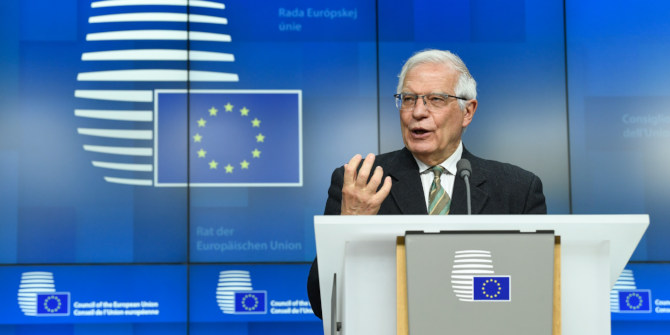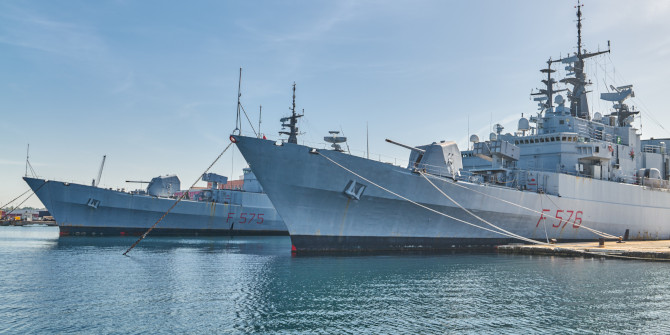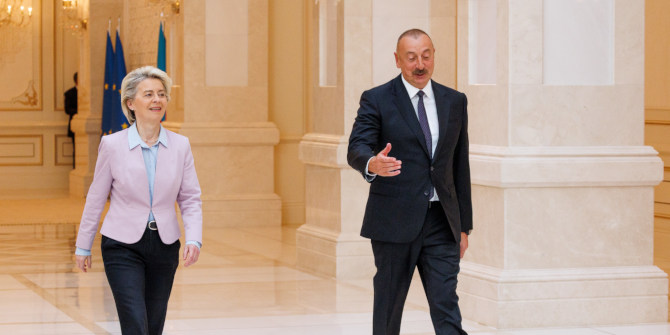In recent months, tensions have escalated between Greece and Turkey over gas reserves and maritime rights in the Eastern Mediterranean. Hans Kribbe argues that while the EU typically gravitates toward the role of an impartial mediator in external conflicts, the present situation in the Mediterranean calls for a different response.
“After the Cold War, the world wasn’t black and white anymore, it was a Picasso painting”, admiral Cem Gurdeniz, chief architect of Turkey’s Blue Homeland strategy, said in 2006. The admiral had a nose for how the world had changed. Until then, he explained, Turkey’s foreign policy could be summarised in just three words: “Whatever NATO decided”.
However, slowly NATO had become an obstacle, according to Gurdeniz, an admirer of Kemal Ataturk, the founder of modern Turkey. And so had the EU. Europe’s policy elites discerned the final victory of white over black, the birth of a global order based on liberal multilateralism, backed by US might.
Gurdeniz saw a different future, made of colliding colours and tangled angular shapes. Placed at the crossroads of the world, Turkey had always attracted empires scavenging for influence, power and bounty. Greeks, Persians, Romans, and later Russians, British and French. And so it would be again.
It meant Turkey needed to steel itself, as it did under Mehmet the Conqueror, the Sultan who in the 15th century took Constantinople, and again some 500 years later under Ataturk, when the victors of World War I conspired to cut Turkey into pieces and throw it in the shark tank.
For Erdogan, Turkey’s Islamist strongman, it took time to fully embrace what some call a “Neo-Ottoman” foreign policy and others refer to as Turkish irredentism. Secular patriots like Cem Gurdeniz did not belong to his tribe. For decades military men had plotted to keep Islamists like Erdogan out of power. But once he had Turkey’s generals under his thumb – Gurdeniz himself faced prosecution – suspicion made way for a cause Islamists and Kemalists could share: the redemption of Turkey’s lost greatness.
Last year, Erdogan posed in front of a by now infamous map of the Eastern Mediterranean that encapsulated the Blue Homeland vision. It awarded Turkey control over some 460,000 additional square kilometres of sea, most of it at the expense of Greece and Cyprus. And that was only the beginning.
This summer Turkey dispatched two seismic survey vessels, flanked by a flotilla of gunships, to explore for gas in waters that Athens says are part of its maritime economic zone. “Turkey will get back its fair share in the Mediterranean, Aegean and the Black Sea,” Erdogan declared. Armed confrontation could only just be avoided. But Turkish vessels probing energy rich Greek waters are bound to continue causing friction. Erdogan rarely walks away from a good scuffle.

Meeting in July 2020 between Hulusi Akar, Turkish Minister of Defence, and Josep Borrell, EU High Representative for Foreign Affairs and Security Policy. Credit: European Council
Turkey’s Blue Homeland doctrine is a strategic threat to Europe, even more so than the geopolitical jockeying in Libya, Syria and Nagorno-Karabakh, in which Erdogan has a hand too. Ankara appears to have set its sights on territory that two of the EU’s member states have long considered their own, and ipso facto the EU’s. It is the sort of move that even Vladimir Putin shies away from.
And yet, how to curtail Erdogan’s irredentist policies is a question Europe cannot seem to agree on. Economic sanctions, as last week’s EU summit showed, remain unlikely. By comparison, agreeing sanctions for Belarus and Russia, the latter for the poisoning of opposition leader Alexey Navalny, proved easy. They are problems that lie within the EU’s comfort zone. Promoting the rule of law and democracy is EU core expertise. The role of the impartial mediator in regional hot zones Europe performs in its sleep. The continent’s Erdogan conundrum, however, is about its own borders, and it possesses no template for how to deal with it.
Conventional foreign policy logic dictates that when neighbours start nibbling at your borders their actions ought to be met with the massive projection of power, the promise of fire and fury, and in this case an unequivocal statement by the EU that it considers the borders of Greece and Cyprus as its own. Otherwise neighbours never stop nibbling.
But to date there has been no such statement. France has come closest, announcing joint naval exercises with Greece. But Germany, holding the EU’s rotating presidency, did what the EU always does in disputes around the world: play the role of the third party mediator and facilitator, hoping to bring the conflict parties around the table.
The absurdity of Berlin’s effort, of course, lies not in the diplomatic solutions it seeks, nor in the rejection of “maximalist” claims on either side, which is only sensible. It lies in the attempt to elevate itself above the conflict parties while some of these parties are fellow members of the EU. If Mexico were ever to put forward claims on the territory of Texas, and send seismic survey vessels into its waters, would the United States government offer to mediate between the two of them? The thought alone invites ridicule.
However, it is precisely what Germany has proposed to do in the Mediterranean. Apparently, Berlin finds it hard to choose sides and say: this is where Europe begins, where we begin and others have no business. The EU is not the US, it might be countered, not a state, which is true. But then Europe has been full of talk of late, not least by Chancellor Merkel, about how it needs a robust and sovereign foreign policy. And without common borders, there is no common foreign policy. Borderless organisations – just think of the UN – don’t have foreign policies.
Now is the time for this penny to drop. The EU has long preferred to wish away the existence of borders. Borders are “static and restrictive… they limit the mind”, a European Commissioner once said. Josep Borrell, the EU’s foreign policy chief, views borders as “scars made by fire and blood”. But in the geopolitical world in which strongmen like Erdogan operate, borders define who you are, and without a clear signal that the EU stands ready to defend those borders, its claim that it is becoming “a player, not a playing field” is entirely spurious.
Clever advocates of Turkey’s cause point out that the EU has no legal competence to meddle in the border disputes of its members. However, what is at stake is not legal competence but the political will to choose sides. Doing so does not necessarily mean imposing crippling EU sanctions on Turkey, even less giving Greek politicians a carte blanche. It also means diplomacy and negotiation. There are carrots and sticks, positive and negative agendas. Both can be brought into play. Behind Erdogan’s sabre-rattling, it ought to be acknowledged, there also hide legitimate grievances and serious arguments. They deserve to be considered.
Turkish officials nevertheless maintain the EU should just mind its own business, and that if anyone, NATO should play the role of mediator. They argue that the EU cannot mediate between Greece and Turkey since it is obviously biased. Ironically, they are right. Of course the EU is biased. But here’s the rub: it has every right to be. The EU is neither the UN nor neutral Switzerland, and the role of mediator is not the only role it can or should perform in the world. Europe has interests and borders. And on this occasion, that makes it a conflict party. The EU should recognise this and begin to act like one.
Note: This article gives the views of the author, not the position of EUROPP – European Politics and Policy or the London School of Economics. Featured image credit: European Council





